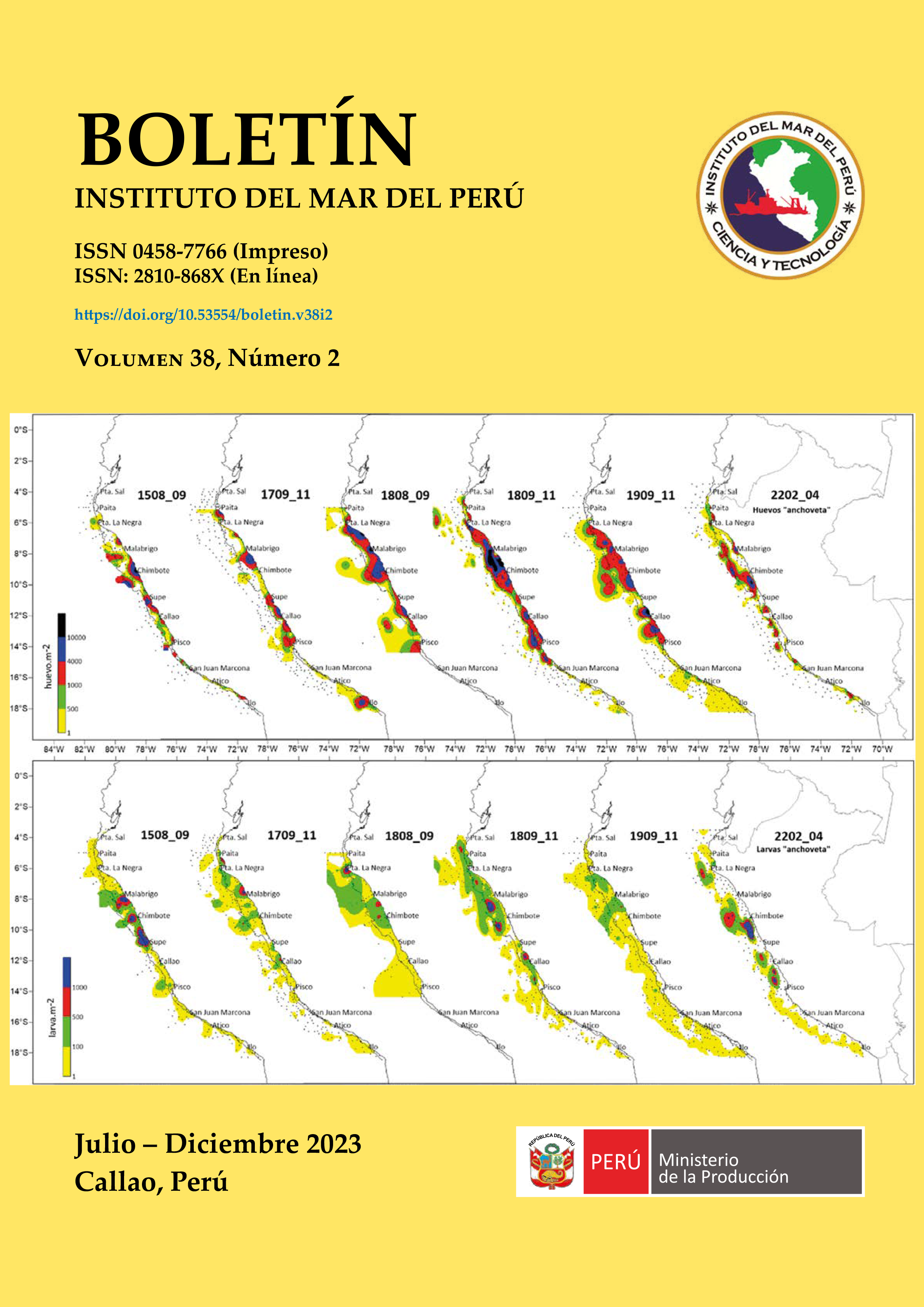Composition, distribution, and abundance of ichthyoplankton between Paita (5°00’S), and Independencia Bay (14°45’S), winter 2018
DOI:
https://doi.org/10.53554/boletin.v38i2.389Keywords:
Ichthyoplankton, Biovolumes, Engraulis ringensAbstract
This study presents the composition, distribution, and abundance of ichthyoplankton species collected during winter 2018 in the area spanning from Paita (5°00’S) to Independencia Bay (14°45’S). Zooplankton biovolumes ranged from 0.012 to 1.989 mL/m3, with a prevalence of biovolumes below 0.2 mL/m3 (49 %), primarily over the continental shelf. Twenty ichthyoplankton species belonging to 14 families were identified. Engraulis ringens emerged as the most frequent and abundant species. Its eggs accounted for 77 %, and larvae for 74 % of the total samples. Their abundance varied from 3 to 17,916 eggs/m2 and 3 to 1,677 larvae/m2, constituting 99 % of the total ichthyoplankton abundance. Larvae of Diogenichthys laternatus and Vinciguerria lucetia were also noticeable, with frequencies of 14 % and 12 % of the samples, respectively. Nonetheless, their abundances were low.
Downloads
Alternative Metrics
Metrics
References
Aronés, K., Girón, M. & Quesquén, R. (2001). Análisis comparativo de ictioplancton colectado con Red Calvet y equipo CUFES en agosto y setiembre 2000. Inf Inst Mar Perú. 162, 51-59. https://hdl.handle.net/20.500.12958/1919
Carrasco, S. & Lozano, O. (1989). Seasonal and long-term variations of zooplankton volumes in the Peruvian Sea 1964 - 1987. In: D. Pauly, D. Muck, J. Mendo, I. Tsukayama (Eds.), The Peruvian Upwelling Ecosystem: Dynamics and Interactions (pp. 82–85). ICLARM. https://hdl.handle.net/20.500.12958/1432
Einarsson, H. & Rojas de Mendiola, B. (1963). Descripción de huevos y larvas de anchoveta (Engraulis ringens J.). Bol. Ins. Recurs. Mar., Callao, I(1),1-23. https://hdl.handle.net/20.500.12958/64
Kramer, D., Kalin, M. J., Stevens, E. G., Thrailkill, J. R. & Zweifel, J. R. (1972). Collecting and processing data on fish eggs and larvae in the California Current Region. NOAA Technical Report NMFS, Circ-370. U. S. Department of Commerce. NOAA. National Marine Fisheries Service. https://spo.nmfs.noaa.gov/sites/default/files/legacy-pdfs/CIRC370.pdf
Moser, H. (1996). The early stages of fishes in the California Current Region. California Cooperative Ocean Fisheries Investigations, 73(3), Atlas Nro. 33, 1505.
Pielou, E. C. (1984). The interpretation of ecological data: a primer on classification and ordination. John Wiley & Sons.
Rojas de Mendiola, B. & Gómez, O. (1981). Daily otolith rings in otoliths of larval anchovy (Engraulis ringens). Rapports et Process verbaux des Reunions. Cons. Int. Explor. Mer., 178, 565-566.
Santander, H. & Sandoval de Castillo, O. (1973). Estudio sobre las primeras etapas de vida de la anchoveta. Inf Inst Mar Perú, 41, 1-30. https://hdl.handle.net/20.500.12958/269
Santander, H., Alheit, J. & Smith, P. (1984). Estimación de la biomasa de la población desovante de anchoveta peruana Engraulis ringens en 1981 por aplicación del “Método de Producción de Huevos”. Bol Inst Mar Perú, 8(6), 209-250. https://hdl.handle.net/20.500.12958/1049
Van Guelpen, L., Markle, D. F. & Duggan, D. J. (1982). An evaluation of accuracy, precision and speed of several zooplankton-subsampling techniques. Journal du Conseil International pour L’exploration de la Mer, 40, 226-236. https://doi.org/10.1093/icesjms/40.3.226
Downloads
Published
How to Cite
Issue
Section
License
Copyright (c) 2023 Boletin Instituto del Mar del Perú

This work is licensed under a Creative Commons Attribution 4.0 International License.
© Bol Inst Mar Perú. La revista retiene los derechos patrimoniales de los autores con la finalidad de garantizar el acceso abierto de los manuscritos.
Todos los manuscritos publicados en la revista se distribuyen bajo la licencia “Creative Commons Atribución - NoComercial - CompartirIgual 4.0 Internacional” (CC BY-NC-SA 4.0). Implica que autores y lectores pueden de forma gratuita descargar, almacenar, copiar, redistribuir, remezclar, transformar o generar obras derivadas a partir del manuscrito, siempre y cuando mencionen la fuente primaria de publicación y la autoría del manuscrito, así como que se realice sin fines comerciales y se distribuya bajo la misma licencia que el original. Puede consultar desde aquí la versión informativa y el texto legal de la licencia.









